MOU
-
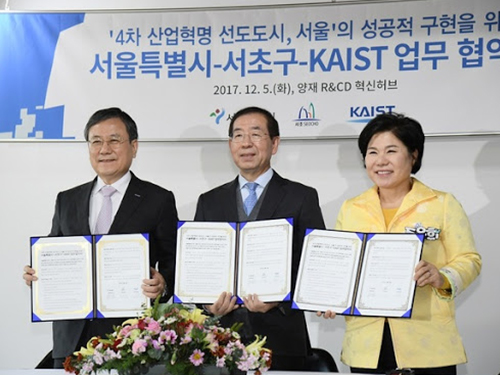 MoU by KAIST-Seoul-Seocho-gu for the 4th Industrial Revolution
The opening ceremony of the Yangjae R&CD Innovation Hub was held in Seoul on December 5. More than 400 guests came to the ceremony from major institutes and companies that are based in the hub. KAIST President Sung-Chul Shin, the Mayor of Seoul, Won-soon Park, and the Mayor of Seocho-gu, Eun Hee Cho, signed an MoU for Seoul to be the leading city for successfully realizing the Fourth Industrial Revolution.
The three organizations aim to cooperate with one another in various areas, including an economic boost for local job creation, technology development, and the promotion of projects through an industry-academia-institute network and fostering manpower.
Yangjae R&CD is the first facility specializing in and dedicated for Artificial Intelligence, which is the major topic of the Fourth Industrial Revolution.
The hub is comprised of enterprises specializing in AI, open co-work spaces, conference rooms, an open networking lounge, and spaces for fostering professional manpower. The hub will recruit additional enterprises and individuals who wish to move in. KAIST, an institute containing professors and researchers in the field of AI, and Modulabs, an organization becoming distinguished in AI research, will be in charge of operating the facility together.
The Yangjae R&CD Innovation Hub will operate a professional training program with participation from KAIST professors, which aims to produce 500 professionals in AI research and development by 2020. It will also provide inexpensive space as well as consultations and venture capital to startup and venture companies. It plans to find and foster 50 innovation companies by 2020.
In particular, the hub will operate a course for new AI business models 24 times over three years.
The hub also offers job consultations, academic conferences, public space for companies residing in the hub, a free GPU cluster server, technical training, seminars, forums, investment attraction, overseas expansion, and one-to-one technical consultations.
The Yangjae R&CD Zone is the place established for the Fourth Industrial Revolution by Seoul. R&CD is a concept combining Research and Development, Connection, Companies, Community, and Culture.
Seoul aims to create the Yangjae Zone as an urban innovation hub for facilitating industry-academia linkage as well as establishing a startup-settlement-growth technical ecosystem.
2017.12.11 View 10970
MoU by KAIST-Seoul-Seocho-gu for the 4th Industrial Revolution
The opening ceremony of the Yangjae R&CD Innovation Hub was held in Seoul on December 5. More than 400 guests came to the ceremony from major institutes and companies that are based in the hub. KAIST President Sung-Chul Shin, the Mayor of Seoul, Won-soon Park, and the Mayor of Seocho-gu, Eun Hee Cho, signed an MoU for Seoul to be the leading city for successfully realizing the Fourth Industrial Revolution.
The three organizations aim to cooperate with one another in various areas, including an economic boost for local job creation, technology development, and the promotion of projects through an industry-academia-institute network and fostering manpower.
Yangjae R&CD is the first facility specializing in and dedicated for Artificial Intelligence, which is the major topic of the Fourth Industrial Revolution.
The hub is comprised of enterprises specializing in AI, open co-work spaces, conference rooms, an open networking lounge, and spaces for fostering professional manpower. The hub will recruit additional enterprises and individuals who wish to move in. KAIST, an institute containing professors and researchers in the field of AI, and Modulabs, an organization becoming distinguished in AI research, will be in charge of operating the facility together.
The Yangjae R&CD Innovation Hub will operate a professional training program with participation from KAIST professors, which aims to produce 500 professionals in AI research and development by 2020. It will also provide inexpensive space as well as consultations and venture capital to startup and venture companies. It plans to find and foster 50 innovation companies by 2020.
In particular, the hub will operate a course for new AI business models 24 times over three years.
The hub also offers job consultations, academic conferences, public space for companies residing in the hub, a free GPU cluster server, technical training, seminars, forums, investment attraction, overseas expansion, and one-to-one technical consultations.
The Yangjae R&CD Zone is the place established for the Fourth Industrial Revolution by Seoul. R&CD is a concept combining Research and Development, Connection, Companies, Community, and Culture.
Seoul aims to create the Yangjae Zone as an urban innovation hub for facilitating industry-academia linkage as well as establishing a startup-settlement-growth technical ecosystem.
2017.12.11 View 10970 -
 KAIST Partners with WEF to Prepare for the 4th Industrial Revolution
KAIST President Sung-Chul Shin and the Head of the World Economic Forum Center for the Fourth Industrial Revolution, Murat Sonmez, made a commitment to build cooperation in an active manner for addressing the ramifications of the Fourth Industrial Revolution.
The two signed an MOU to cooperate in research in related fields on October 13 after holding a roundtable discussion titled “The Future of Jobs and Inclusive Growth in Korea”. It is the first partnership that the WEF has sealed with an academic institution.The roundtable discussion brought together distinguished guests from politics, non-profit civic organizations, academia, and enterprises including Daejeon Mayor Seon-Taek Kwon, Doosan Group Vice Chairman Lee Hyun-Soon, and Korean Venture Business Association President Ahn Keon-Joon.
During the news conference, President Shin said, “This event means a lot because it explores ways in which inclusive growth and job creation can be realized in Korea. To move forward in the new age of the Fourth Industrial Revolution, every country needs to adopt appropriate new policies suitable for their specific market environments. KAIST will contribute to this process for Korea as well as for the global community.”
President Shin also said, “Korea has been a fast follower in previous industrial revolutions. Now, we have the momentum to seize the opportunities in the wake of this revolution. KAIST is dedicated to leading Korea into becoming a first mover in the Fourth Industrial Revolution by cooperating with the WEF.”
“Two decades later, we will live with considerable number of robots around us. It is possible that our societies in the future will consist of Homo sapiens and Robo sapiens. We need to create new jobs for Homo sapiens to prepare for a society that we will have to coexist with a new industrial tribe. Industries need continuing education to retrain workers for the ever evolving industrial landscape of the future,” President Shin emphasized.
Meanwhile, Sonmez pointed out that all stakeholders should participate in understanding the new industrial environment’s ramifications, saying “Societies, governments, public and private sectors, startups, and academia should co-design inclusive models through global efforts. Ethics and influences on the job market should also be taken into consideration.”
Sonmez said nine factors such as blockchains, internet of things, artificial intelligence, machine learning, cross-border data blow, drones, 3D printing, autonomous driving, the environment, and precision medicine will take center stage in the Fourth Industrial Revolution, In particular, he said that blockchains, which are a cybersecurity technology for online financial transactions, will bring even bigger changes than the ‘World Wide Web’ has done over the past three decades.
“To this end, we will have to work closely with major academic institutes. Through this partnership with KAIST, we will make the fruits of the new industrial environment benefit Koreans and Korean society,” Sonmez added.
2017.10.14 View 9919
KAIST Partners with WEF to Prepare for the 4th Industrial Revolution
KAIST President Sung-Chul Shin and the Head of the World Economic Forum Center for the Fourth Industrial Revolution, Murat Sonmez, made a commitment to build cooperation in an active manner for addressing the ramifications of the Fourth Industrial Revolution.
The two signed an MOU to cooperate in research in related fields on October 13 after holding a roundtable discussion titled “The Future of Jobs and Inclusive Growth in Korea”. It is the first partnership that the WEF has sealed with an academic institution.The roundtable discussion brought together distinguished guests from politics, non-profit civic organizations, academia, and enterprises including Daejeon Mayor Seon-Taek Kwon, Doosan Group Vice Chairman Lee Hyun-Soon, and Korean Venture Business Association President Ahn Keon-Joon.
During the news conference, President Shin said, “This event means a lot because it explores ways in which inclusive growth and job creation can be realized in Korea. To move forward in the new age of the Fourth Industrial Revolution, every country needs to adopt appropriate new policies suitable for their specific market environments. KAIST will contribute to this process for Korea as well as for the global community.”
President Shin also said, “Korea has been a fast follower in previous industrial revolutions. Now, we have the momentum to seize the opportunities in the wake of this revolution. KAIST is dedicated to leading Korea into becoming a first mover in the Fourth Industrial Revolution by cooperating with the WEF.”
“Two decades later, we will live with considerable number of robots around us. It is possible that our societies in the future will consist of Homo sapiens and Robo sapiens. We need to create new jobs for Homo sapiens to prepare for a society that we will have to coexist with a new industrial tribe. Industries need continuing education to retrain workers for the ever evolving industrial landscape of the future,” President Shin emphasized.
Meanwhile, Sonmez pointed out that all stakeholders should participate in understanding the new industrial environment’s ramifications, saying “Societies, governments, public and private sectors, startups, and academia should co-design inclusive models through global efforts. Ethics and influences on the job market should also be taken into consideration.”
Sonmez said nine factors such as blockchains, internet of things, artificial intelligence, machine learning, cross-border data blow, drones, 3D printing, autonomous driving, the environment, and precision medicine will take center stage in the Fourth Industrial Revolution, In particular, he said that blockchains, which are a cybersecurity technology for online financial transactions, will bring even bigger changes than the ‘World Wide Web’ has done over the past three decades.
“To this end, we will have to work closely with major academic institutes. Through this partnership with KAIST, we will make the fruits of the new industrial environment benefit Koreans and Korean society,” Sonmez added.
2017.10.14 View 9919 -
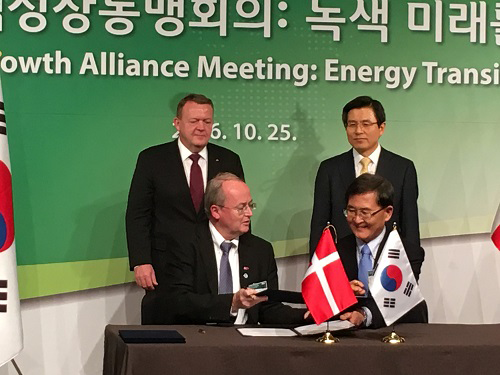 MOU between KAIST and DTU Signed
KAIST and the Technical University of Denmark (DTU) signed a memorandum of understanding (MOU) to cooperate in the areas of startup, student exchange, and joint research on October 25, 2016 at the Embassy of Denmark in Seoul, Korea. Under the agreement, KAIST and DTU will exchange students and researchers through startup programs and continue to collaborating in education and research.
The MOU was facilitated during the Green Growth Alliance Meeting and Energy Seminar hosted by the Danish embassy, in which Danish Prime Minister Lars Løkke Rasmussen participated.
President Steve Kang of KAIST, who fostered the agreement, said,
“DTU has been one of our strategic partners in Europe. We have been working closely with them on academic exchanges and research collaborations, but now with the expansion of our cooperation into entrepreneurship, we will create momentum to spur startups in both schools. To support such activities, we will use KAIST’s experiences acquired from operating the K-School, an entrepreneurship graduate school, and the Institute of KAIST Entrepreneurship. DTU will also share their knowledge on startup programs including SkyLab and StartDTU. I believe this will become another successful alliance between the two universities.”
As of October 2016, KAIST has made 18 agreements with DTU, exchanging 120 students in the past three years and implementing various joint seminars and conferences for academic and research exchanges.
Established in 1829, DTU has been a leading science and technology university in Denmark. It ranked 109 in the QS World University Rankings 2016 and 46th in its subject rankings in engineering and technology.
In the picture below, President Steve Kang of KAIST (right) and Senior Vice President Martin P. Bendsøe of the Technical University of Denmark (left) are signing an agreement for academic and research cooperation.
2016.10.27 View 8572
MOU between KAIST and DTU Signed
KAIST and the Technical University of Denmark (DTU) signed a memorandum of understanding (MOU) to cooperate in the areas of startup, student exchange, and joint research on October 25, 2016 at the Embassy of Denmark in Seoul, Korea. Under the agreement, KAIST and DTU will exchange students and researchers through startup programs and continue to collaborating in education and research.
The MOU was facilitated during the Green Growth Alliance Meeting and Energy Seminar hosted by the Danish embassy, in which Danish Prime Minister Lars Løkke Rasmussen participated.
President Steve Kang of KAIST, who fostered the agreement, said,
“DTU has been one of our strategic partners in Europe. We have been working closely with them on academic exchanges and research collaborations, but now with the expansion of our cooperation into entrepreneurship, we will create momentum to spur startups in both schools. To support such activities, we will use KAIST’s experiences acquired from operating the K-School, an entrepreneurship graduate school, and the Institute of KAIST Entrepreneurship. DTU will also share their knowledge on startup programs including SkyLab and StartDTU. I believe this will become another successful alliance between the two universities.”
As of October 2016, KAIST has made 18 agreements with DTU, exchanging 120 students in the past three years and implementing various joint seminars and conferences for academic and research exchanges.
Established in 1829, DTU has been a leading science and technology university in Denmark. It ranked 109 in the QS World University Rankings 2016 and 46th in its subject rankings in engineering and technology.
In the picture below, President Steve Kang of KAIST (right) and Senior Vice President Martin P. Bendsøe of the Technical University of Denmark (left) are signing an agreement for academic and research cooperation.
2016.10.27 View 8572 -
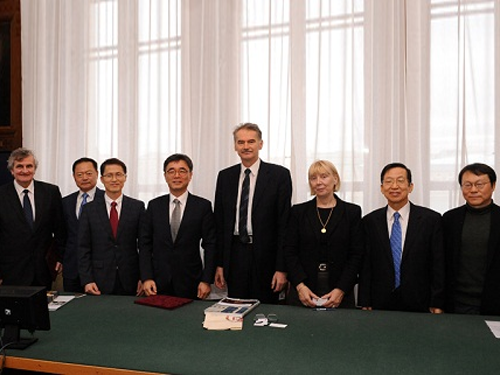 KAIST and the Budapest University of Technology and Economics Agree to Cooperate in Education and Research
KAIST and the Budapest University of Technology and Economics in Hungary extended their existing agreement for comprehensive cooperation in education and research, and signed a new memorandum of understanding (MOU) for student exchanges on October 19, 2016, at Budapest University.
The two universities will exchange faculty, researchers, and students for education and research collaboration, implement dual degree programs, conduct joint lectures and research projects, and share infrastructures and talent pools.
These agreements were part of the agenda for the 8th Meeting of the Korea and Hungary Science and Technology Joint Committee, which took place October 17-19, 2016, in Budapest.
President Sung-Mo Kang of KAIST, Associate Vice President Sung-Hyon Myaeng of the International Office, and Director General Won-Ho Choi of International Relations at the Ministry of Science, ICT and Future Planning of Korea were present at the MOU singing.
Associate Vice President Myaeng said:
“Traditionally, the Budapest University of Technology and Economics has been known for its strong base in the natural sciences. Combining this with KAIST’s excellence in engineering, the two universities will bring synergistic effects that will help further develop the schools as well as their host nations.”
“Finding partners to implement joint research projects sponsored by the European Union or establishing cooperative networks among future talents between the two countries through various student exchange programs can be a good starting point,” he added.
The Budapest University of Technology and Economics was created in 1782, and is one of the most prestigious universities in Hungary, having produced three Nobel Prize laureates. It has a highly-globalized campus, where one third of its student population is made up of international students, and offers lectures and research in English.
In addition, the Hungarian-Korean Technical Cooperation Center Foundation, established in 1992 and based in Budapest, hosted a seminar on science in Korea and Hungary on October 17, 2016. At the seminar, Korean and Hungarian participants discussed issues on the two nations’ science, technology, and strategies to drive innovation under the topic “The Technical Innovation-Importance of Startup Companies.”
Associate Vice President Sung-Hyon Myaeng of the International Office, KAIST, is pictured fourth from the left, and János Józsa, rector of the Budapest University of Technology and Economics, is fifth from the left.
2016.10.20 View 8733
KAIST and the Budapest University of Technology and Economics Agree to Cooperate in Education and Research
KAIST and the Budapest University of Technology and Economics in Hungary extended their existing agreement for comprehensive cooperation in education and research, and signed a new memorandum of understanding (MOU) for student exchanges on October 19, 2016, at Budapest University.
The two universities will exchange faculty, researchers, and students for education and research collaboration, implement dual degree programs, conduct joint lectures and research projects, and share infrastructures and talent pools.
These agreements were part of the agenda for the 8th Meeting of the Korea and Hungary Science and Technology Joint Committee, which took place October 17-19, 2016, in Budapest.
President Sung-Mo Kang of KAIST, Associate Vice President Sung-Hyon Myaeng of the International Office, and Director General Won-Ho Choi of International Relations at the Ministry of Science, ICT and Future Planning of Korea were present at the MOU singing.
Associate Vice President Myaeng said:
“Traditionally, the Budapest University of Technology and Economics has been known for its strong base in the natural sciences. Combining this with KAIST’s excellence in engineering, the two universities will bring synergistic effects that will help further develop the schools as well as their host nations.”
“Finding partners to implement joint research projects sponsored by the European Union or establishing cooperative networks among future talents between the two countries through various student exchange programs can be a good starting point,” he added.
The Budapest University of Technology and Economics was created in 1782, and is one of the most prestigious universities in Hungary, having produced three Nobel Prize laureates. It has a highly-globalized campus, where one third of its student population is made up of international students, and offers lectures and research in English.
In addition, the Hungarian-Korean Technical Cooperation Center Foundation, established in 1992 and based in Budapest, hosted a seminar on science in Korea and Hungary on October 17, 2016. At the seminar, Korean and Hungarian participants discussed issues on the two nations’ science, technology, and strategies to drive innovation under the topic “The Technical Innovation-Importance of Startup Companies.”
Associate Vice President Sung-Hyon Myaeng of the International Office, KAIST, is pictured fourth from the left, and János Józsa, rector of the Budapest University of Technology and Economics, is fifth from the left.
2016.10.20 View 8733 -
 KAIST Signs an Agreement with CSC for Cooperation
KAIST and the China Scholarship Council (CSC) established a memorandum of understanding (MOU) to support the admission of Chinese students to KAIST on October 5, 2016 in Seoul. KAIST is the only institution in Korea made such agreement with the CSC.
Affiliated with the Ministry of Education of China, the CSC is a non-profit institution that provides financial assistance to Chinese students to study abroad and to internationals wishing to study in China. The CSC has supported 500,000 Chinese students for their studying and living in a foreign country, and this year alone, it provided outbound Chinese students with scholarships of approximately USD 100 million.
Under the MOU, Chinese students admitted to KAIST’s master’s and doctoral programs will receive finical support from CSC, including monthly stipends and roundtrip airfare from China to Korea.
President Sung-Mo Kang of KAIST said, “This is a great opportunity for us because we can invite more outstanding Chinese students. They will make our campus more diverse and global, while their academic experiences will become richer with KAIST’s offerings in education and research. I hope many Chinese students will capitalize on this chance to come to KAIST for their advanced degrees in science and technology.”
In the picture below, President Steve Kang of KAIST, on the right, is pictured with Secretary General Liu Jinghui of China Scholarship Council.
2016.10.19 View 7108
KAIST Signs an Agreement with CSC for Cooperation
KAIST and the China Scholarship Council (CSC) established a memorandum of understanding (MOU) to support the admission of Chinese students to KAIST on October 5, 2016 in Seoul. KAIST is the only institution in Korea made such agreement with the CSC.
Affiliated with the Ministry of Education of China, the CSC is a non-profit institution that provides financial assistance to Chinese students to study abroad and to internationals wishing to study in China. The CSC has supported 500,000 Chinese students for their studying and living in a foreign country, and this year alone, it provided outbound Chinese students with scholarships of approximately USD 100 million.
Under the MOU, Chinese students admitted to KAIST’s master’s and doctoral programs will receive finical support from CSC, including monthly stipends and roundtrip airfare from China to Korea.
President Sung-Mo Kang of KAIST said, “This is a great opportunity for us because we can invite more outstanding Chinese students. They will make our campus more diverse and global, while their academic experiences will become richer with KAIST’s offerings in education and research. I hope many Chinese students will capitalize on this chance to come to KAIST for their advanced degrees in science and technology.”
In the picture below, President Steve Kang of KAIST, on the right, is pictured with Secretary General Liu Jinghui of China Scholarship Council.
2016.10.19 View 7108 -
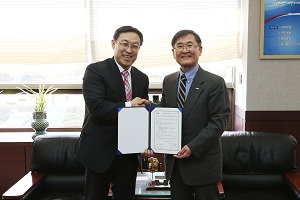 KAIST & the Classic 500 Co Sign for Mobile Healthcare Research
KAIST and The Classic 500 Co., Ltd., an elder care provider based in Seoul, signed a memorandum of understanding to expand medical services by cooperating on the research of medical services and IT on March 24, 2015.
Twenty people from the two institutions, including President Steve Kang, Dong-Hyun Bak, CEO of The Classic 500 and Mun-Sul Jeong, a former KAIST Chairman of the Board, attended the signing ceremony.
Under the agreement, the two institutions will cooperate on mobile healthcare research and the development of a telemedicine system. They will also research and develop a system to better serve society with medical services.
The Classic 500, established by Konkuk University in Korea, provides nursing care services and assisted living facilities for senior citizens.
2015.03.26 View 9643
KAIST & the Classic 500 Co Sign for Mobile Healthcare Research
KAIST and The Classic 500 Co., Ltd., an elder care provider based in Seoul, signed a memorandum of understanding to expand medical services by cooperating on the research of medical services and IT on March 24, 2015.
Twenty people from the two institutions, including President Steve Kang, Dong-Hyun Bak, CEO of The Classic 500 and Mun-Sul Jeong, a former KAIST Chairman of the Board, attended the signing ceremony.
Under the agreement, the two institutions will cooperate on mobile healthcare research and the development of a telemedicine system. They will also research and develop a system to better serve society with medical services.
The Classic 500, established by Konkuk University in Korea, provides nursing care services and assisted living facilities for senior citizens.
2015.03.26 View 9643 -
 KAIST and Hancom Sign for Development of Mobile Healthcare
KAIST signed a memorandum of understanding with Hancom, Inc., an office suite developer in Korea, to foster mobile healthcare software programs. President Steve Kang and Chairman Sang-Chul Kim of Hancom held a signing ceremony on March 13, 2015 at the KAIST campus.
Based on the agreement, KAIST and Hancom will exchange research personnel to build Dr. M, a smart healthcare platform developed by the university, collaborate in research and development, and cooperate in the transfer of research developments from the university to the software industry including Hancom.
KAIST and Hancom also signed a memorandum of understanding on the development of software in April 2014. The Hancom-KAIST Research Center opened on campus last October.
2015.03.20 View 10530
KAIST and Hancom Sign for Development of Mobile Healthcare
KAIST signed a memorandum of understanding with Hancom, Inc., an office suite developer in Korea, to foster mobile healthcare software programs. President Steve Kang and Chairman Sang-Chul Kim of Hancom held a signing ceremony on March 13, 2015 at the KAIST campus.
Based on the agreement, KAIST and Hancom will exchange research personnel to build Dr. M, a smart healthcare platform developed by the university, collaborate in research and development, and cooperate in the transfer of research developments from the university to the software industry including Hancom.
KAIST and Hancom also signed a memorandum of understanding on the development of software in April 2014. The Hancom-KAIST Research Center opened on campus last October.
2015.03.20 View 10530 -
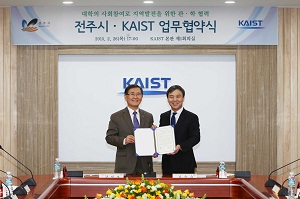 KAIST Signs MOU with Jeonju City
KAIST signed a memorandum of understanding for the development of new industries based on convergence technology with the government of Jeonju City on February 26, 2015. Located in the south west portion of the Korean peninsula, Jeonju City is home to a rich historical and cultural heritage.
Taking advantage of its proximity to the university's campus, the city will cooperate with KAIST to develop the local economy through creating new industries and jobs. To that end, KAIST and Jeonju will foster carbon-based industry, 3D printing technology, the Internet of Things, and emerging technologies. The two organizations also hope this cooperation will produce highly educated manpower for research and development in the city and offer the city to conduct national research projects.
President Sung-Mo Kang and Mayor Seung-Soo Kim pose after signing in the picture below.
2015.02.26 View 8573
KAIST Signs MOU with Jeonju City
KAIST signed a memorandum of understanding for the development of new industries based on convergence technology with the government of Jeonju City on February 26, 2015. Located in the south west portion of the Korean peninsula, Jeonju City is home to a rich historical and cultural heritage.
Taking advantage of its proximity to the university's campus, the city will cooperate with KAIST to develop the local economy through creating new industries and jobs. To that end, KAIST and Jeonju will foster carbon-based industry, 3D printing technology, the Internet of Things, and emerging technologies. The two organizations also hope this cooperation will produce highly educated manpower for research and development in the city and offer the city to conduct national research projects.
President Sung-Mo Kang and Mayor Seung-Soo Kim pose after signing in the picture below.
2015.02.26 View 8573 -
 KAIST and ETH Zürich Sign a MOU on Cooperation in Education and Research
KAIST and ETH Zürich, a leading engineering, science, and technology university in Switzerland, signed a memorandum of understanding (MOU) to cooperate in engineering education and research on November 3, 2014 at the KAIST campus.
The two universities have agreed to implement student and academic exchange programs, collaborate on research in the advanced fields of engineering, and host joint conferences and seminars.
President Steve Kang of KAIST (on the right in the picture below) and President Ralph Eichler of ETH Zürich (on the left) attended the signing ceremony.
President Kang commented that KAIST and ETH Zürich would mutually benefit from the cooperation, sharing their knowledge and resources to further develop their faculty and student's work in the field.
2014.11.11 View 7097
KAIST and ETH Zürich Sign a MOU on Cooperation in Education and Research
KAIST and ETH Zürich, a leading engineering, science, and technology university in Switzerland, signed a memorandum of understanding (MOU) to cooperate in engineering education and research on November 3, 2014 at the KAIST campus.
The two universities have agreed to implement student and academic exchange programs, collaborate on research in the advanced fields of engineering, and host joint conferences and seminars.
President Steve Kang of KAIST (on the right in the picture below) and President Ralph Eichler of ETH Zürich (on the left) attended the signing ceremony.
President Kang commented that KAIST and ETH Zürich would mutually benefit from the cooperation, sharing their knowledge and resources to further develop their faculty and student's work in the field.
2014.11.11 View 7097 -
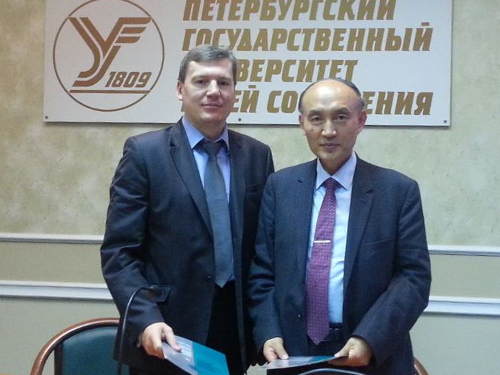 KAIST and Petersburg State Transport University Sign a MOU on Green Transportation
The Petersburg State Transport University (PSTU) in Russia is a higher education institution specializing in railway transport.
KAIST and PSTU signed a memorandum of understating (MOU) on October 28, 2014 at the KAIST campus and agreed to collaborate in the research of and hold academic exchanges for green transportation.
Based on the agreement, the two institutions will collaborate in the development of a high capacity railway that is powered through wireless power transfer technology and will exchange personnel and academic knowledge to advance the field of green transportation.
The Graduate School for Green Transportation (GSGT) at KAIST organized a seminar which took place after the MOU signing ceremony. Professor Dong-Ho Cho, the Dean of GSGT, presented a keynote speech at the seminar on “Korea’s Green Transportation Policy and Its Technology Development Status” to the audience including the PSTU delegation.
Established in 1809, PSTU is one of the oldest and most prestigious engineering universities in Russia, serving as an important scientific and research center in the area of engineering, construction, and railway operation.
2014.11.04 View 10191
KAIST and Petersburg State Transport University Sign a MOU on Green Transportation
The Petersburg State Transport University (PSTU) in Russia is a higher education institution specializing in railway transport.
KAIST and PSTU signed a memorandum of understating (MOU) on October 28, 2014 at the KAIST campus and agreed to collaborate in the research of and hold academic exchanges for green transportation.
Based on the agreement, the two institutions will collaborate in the development of a high capacity railway that is powered through wireless power transfer technology and will exchange personnel and academic knowledge to advance the field of green transportation.
The Graduate School for Green Transportation (GSGT) at KAIST organized a seminar which took place after the MOU signing ceremony. Professor Dong-Ho Cho, the Dean of GSGT, presented a keynote speech at the seminar on “Korea’s Green Transportation Policy and Its Technology Development Status” to the audience including the PSTU delegation.
Established in 1809, PSTU is one of the oldest and most prestigious engineering universities in Russia, serving as an important scientific and research center in the area of engineering, construction, and railway operation.
2014.11.04 View 10191 -
 KAIST and University of California, Santa Cruz, Agree to Cooperate
KAIST and the University of California in Santa Cruz signed a memorandum of understanding (MOU) at the KAIST campus on October 14, 2014.
The two institutions agreed to cooperate in the following four areas:
- Research collaboration in genomics and biology
- Academic exchanges in engineering and information communication technology
- Student and faculty exchange programs
- Joint academic workshops and seminars
Following the MOU signing ceremony, Dr. George Blumenthal, the Chancellor of UC Santa Cruz, held a special seminar for KAIST students and faculty, during which he shared some of the success stories made through UC Santa Cruz’s close cooperation with companies in Silicon Valley.
President Steve Kang of KAIST praised the MOU saying, “KAIST and UC Santa Cruz have top-notch research professionals, and the MOU will reinforce their research capability. We hope that the two universities will carry out many research projects that bring significant impact on the world.”
UC Santa Cruz was established in 1965 as a public research university committed to undergraduate education. The university has a total student population of 16,000 (15,375 undergraduates and 1,378 graduates). Offering 60 undergraduate majors, UC Santa Cruz's faculty includes six recipients of Pulitzer Prizes and five MacArthur Genius Awards. The university was ranked the 2nd in the world for research influence in 2012-2013 Times Higher Education rankings.
2014.10.15 View 9137
KAIST and University of California, Santa Cruz, Agree to Cooperate
KAIST and the University of California in Santa Cruz signed a memorandum of understanding (MOU) at the KAIST campus on October 14, 2014.
The two institutions agreed to cooperate in the following four areas:
- Research collaboration in genomics and biology
- Academic exchanges in engineering and information communication technology
- Student and faculty exchange programs
- Joint academic workshops and seminars
Following the MOU signing ceremony, Dr. George Blumenthal, the Chancellor of UC Santa Cruz, held a special seminar for KAIST students and faculty, during which he shared some of the success stories made through UC Santa Cruz’s close cooperation with companies in Silicon Valley.
President Steve Kang of KAIST praised the MOU saying, “KAIST and UC Santa Cruz have top-notch research professionals, and the MOU will reinforce their research capability. We hope that the two universities will carry out many research projects that bring significant impact on the world.”
UC Santa Cruz was established in 1965 as a public research university committed to undergraduate education. The university has a total student population of 16,000 (15,375 undergraduates and 1,378 graduates). Offering 60 undergraduate majors, UC Santa Cruz's faculty includes six recipients of Pulitzer Prizes and five MacArthur Genius Awards. The university was ranked the 2nd in the world for research influence in 2012-2013 Times Higher Education rankings.
2014.10.15 View 9137 -
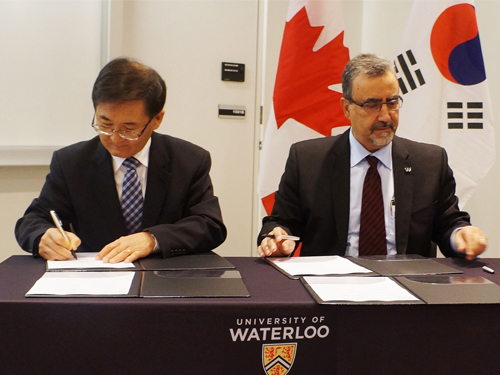 KAIST and University of Waterloo in Canada Agree to Enhance Cooperation
KAIST and the University of Waterloo, Canada, signed a memorandum of understanding (MOU) to explore collaboration in education and research in areas such as computer science, electrical engineering, chemical engineering, quantum computing, and nanotechnology. The two universities also agreed to expand their cooperation in entrepreneurship, technology transfer, and startup support programs. The signing ceremony took place at the University of Waterloo (UW) in Ontario, Canada, on September 22, 2014.
Feridun Hamdullahpur, president and vice-chancellor of UW, noted that “KAIST and the University of Waterloo have so much in common. Both institutions pursue excellence in teaching and research, attract some of the highest quality students and faculty alike, and seek out innovation that has the potential to change the world.”
President Steve Kang said, “The University of Waterloo has been leading the co-operative education field, offering valuable opportunities to young students to receive classroom-based education with practical work experience. This has been an important approach in higher education, and perhaps more so in this age when technological innovations create new values for social advancement and new opportunities for better growth. I hope that through the collaboration, KAIST and the University of Waterloo will produce research outcomes with global recognition.”
The University of Waterloo, located at the heart of Canada’s technology hub, has become one of the nation’s leading comprehensive universities in just half a century. The university is home to the world’s largest post-secondary co-operative education program, encouraging enterprising partnerships in learning and research.
The picture shows the signing of the MOU by President Steve Kang (right) and President and Vice-chancellor Feridun Hamdullahpur (left).
2014.09.26 View 8844
KAIST and University of Waterloo in Canada Agree to Enhance Cooperation
KAIST and the University of Waterloo, Canada, signed a memorandum of understanding (MOU) to explore collaboration in education and research in areas such as computer science, electrical engineering, chemical engineering, quantum computing, and nanotechnology. The two universities also agreed to expand their cooperation in entrepreneurship, technology transfer, and startup support programs. The signing ceremony took place at the University of Waterloo (UW) in Ontario, Canada, on September 22, 2014.
Feridun Hamdullahpur, president and vice-chancellor of UW, noted that “KAIST and the University of Waterloo have so much in common. Both institutions pursue excellence in teaching and research, attract some of the highest quality students and faculty alike, and seek out innovation that has the potential to change the world.”
President Steve Kang said, “The University of Waterloo has been leading the co-operative education field, offering valuable opportunities to young students to receive classroom-based education with practical work experience. This has been an important approach in higher education, and perhaps more so in this age when technological innovations create new values for social advancement and new opportunities for better growth. I hope that through the collaboration, KAIST and the University of Waterloo will produce research outcomes with global recognition.”
The University of Waterloo, located at the heart of Canada’s technology hub, has become one of the nation’s leading comprehensive universities in just half a century. The university is home to the world’s largest post-secondary co-operative education program, encouraging enterprising partnerships in learning and research.
The picture shows the signing of the MOU by President Steve Kang (right) and President and Vice-chancellor Feridun Hamdullahpur (left).
2014.09.26 View 8844